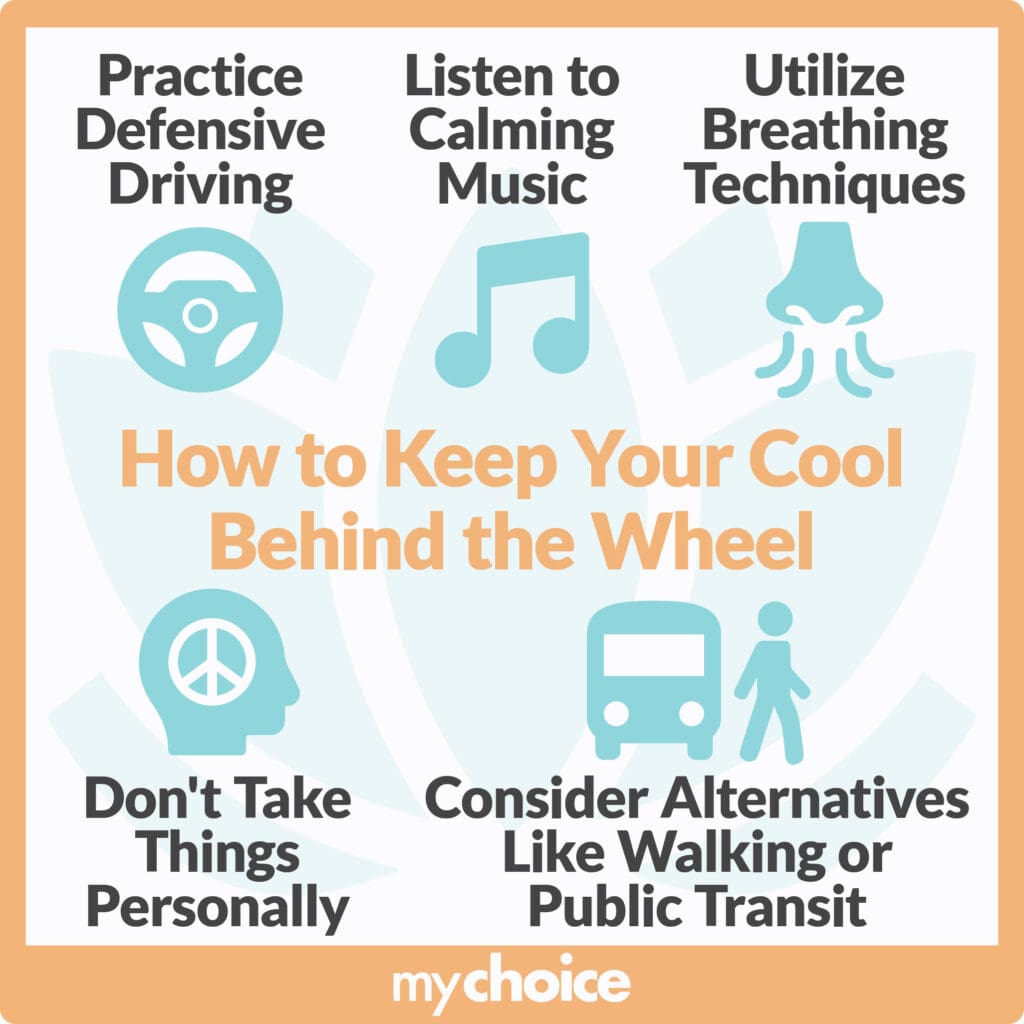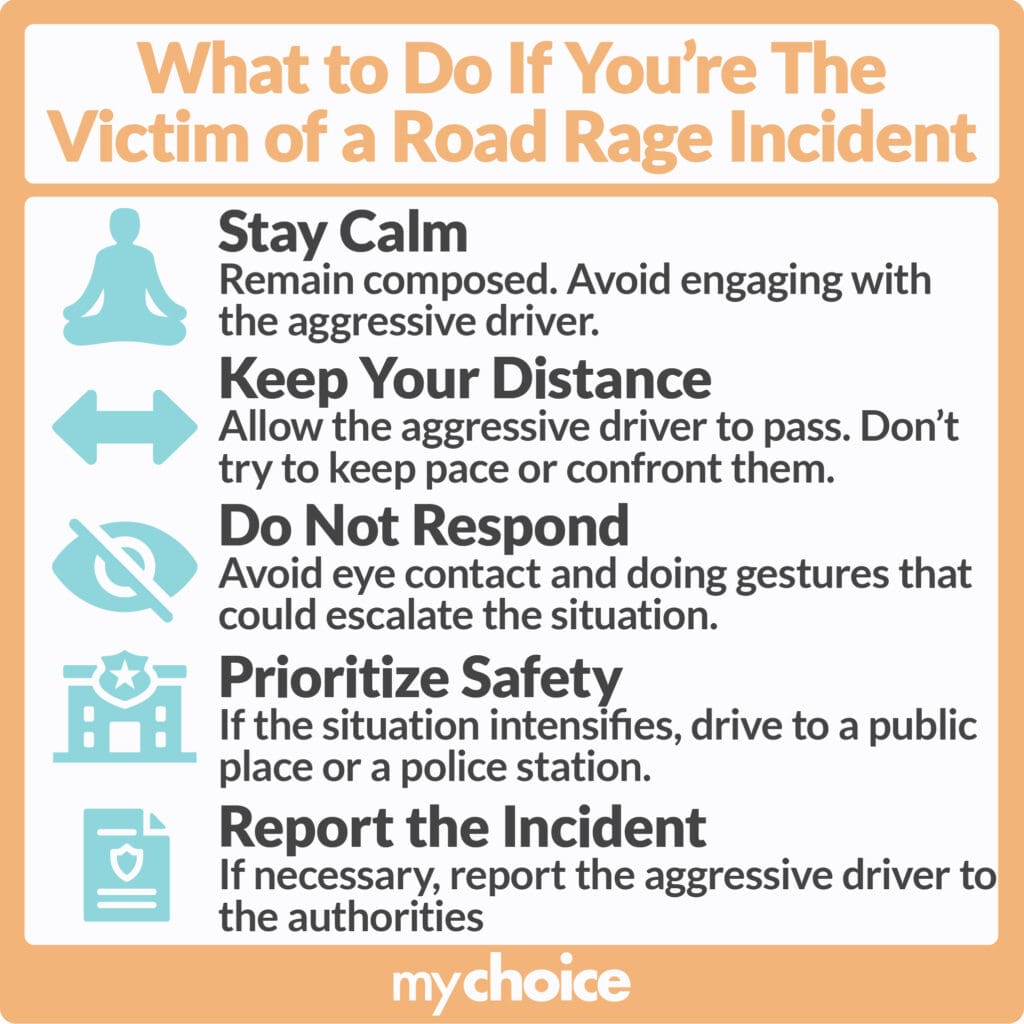If you’ve ever been frustrated and annoyed by traffic, other drivers, or bad driving conditions, you’ve definitely noticed that your bad mood affects the way you drive. In some cases, it pushes drivers to speed or behave recklessly – but if a situation ramps up, some drivers experience road rage and may try to hurt other people while driving.
How to Deal With Road Rage at a Glance
- Road rage and aggressive driving can have serious consequences, such as fines, criminal convictions, and higher car insurance quotes.
- If you’re feeling frustrated on the road, listen to calming music, take a deep breath, or even pull over if needed to keep both yourself and other people safe.
- Defensive driving teaches you to give enough space, maintain a safe speed, and keep a tense situation with other drivers from escalating.
Wondering how you can best handle frustration while driving? Read on to learn more about what behaviours are considered aggressive driving, what risks you face if you drive aggressively, and how to deal with road rage.
What Is Aggressive Driving?
Aggressive driving is a range of risky behaviours that are intentional and not accidental, which aren’t related to the weather, road conditions, or other external factors. They are a driver’s choice on how to negatively behave while they’re driving, often due to frustration and wanting to “get even” because of a perceived slight.
Examples of aggressive driving behaviours include:
- Tailgating
- Running red lights
- Swearing, shouting, and gesturing at other drivers
- Reckless speeding
- Ignoring traffic signs and signals
- Repeated horn honking when irritated
- Abruptly cutting other drivers off or refusing to yield
Are Road Rage and Aggressive Driving The Same Thing?
The terms “road rage” and “aggressive driving” are often used interchangeably, but there’s a key difference between these two. With aggressive driving, drivers willingly behave in a risky manner but they don’t intend to hurt anyone. People experiencing road rage behave in a risky manner with the intention of hurting someone with their behaviour.
Drivers with road rage may attempt to:
- Damage someone’s vehicle or other things on the road, such as traffic signs or barriers
- Hurt, intimidate, or even kill another driver, passenger, or pedestrian
What Are The Risks and Consequences of Driving While Frustrated?
Driving while frustrated can cause serious consequences for both drivers and the people around them. These are the most common risks if you’re angry or aggressive while driving:
- Loss of your driver’s license: If your frustration on the road makes you drive unsafely, you may be convicted of offences that will put demerit points on your driver’s license. Accumulating a certain number of demerit points will cause your license to be suspended or even revoked.
- Criminal convictions: Apart from provincial laws that impose fines, the Criminal Code of Canada imposes imprisonment for drivers convicted of operating a vehicle dangerously. The penalties are even higher for reckless driving that results in bodily injury or death.
- Higher vehicle insurance premiums: Auto insurance companies will sometimes go as far back as ten years into an applicant’s driving record to assess the risk of insuring them and their car. If you’ve gotten frustrated and driven aggressively, the resulting demerit points and notes on your record may result in higher insurance quotes.
Tips For How To Deal With Road Rage
There are times that our day or other people’s behaviour can get the best of us, but it’s important not to let it escalate to road rage and endanger others. If you’re feeling frustrated and tempted to drive recklessly, here are some things you can do to manage your road rage:
Pull Over
If you’re feeling overwhelmed by angry thoughts or the aggressive behaviour of other drivers, pull over until you’ve calmed down. It’s better to take a beat to let yourself shake off the anger instead of staying on the road and risking getting aggressive.
Stay Calm and Drive Defensively
Other drivers may be driving recklessly, which may push you to retaliate and drive just as recklessly. Maintain a safe driving speed and a safe distance from aggressive drivers and avoid confrontations. These are tips that are part of defensive driving, which is a technique that reduces risks and incidents due to reckless road behaviour.
If you want to learn more about defensive driving, you can sign up for a course to improve your skills and safety awareness. Apart from helping you stay safe on the road, it can get you discounted car insurance. Some Canadian auto insurers offer discounts to applicants who complete defensive driving courses, because it shows that you’re less likely to engage in risky behaviour on the road.
Use Calming Techniques
Deep breathing and listening to soothing music can help manage your emotions behind the wheel. Try taking a deep breath and counting to seven, then releasing that breath and counting to eight and repeating this cycle until you’ve calmed down. There are many techniques you can try to calm down, but whichever you choose, it’s key that they help you relax and clear your head.
Remember That The Other Driver Is a Stranger and Mistakes Happen
Remind yourself that you shouldn’t let someone you don’t even know have an impact on your mood and behaviour. It’s also good to give people the benefit of the doubt and consider that they just made a mistake, instead of thinking right away that they were driving recklessly on purpose. By not taking their actions personally, you reduce your frustration on the road.
Get Enough Rest Before Driving
If you feel exhausted behind the wheel, this can worsen your feelings of frustration and make you more likely to drive recklessly. Make sure you get enough sleep or time to nap and destress before driving, especially during a long trip.
Remind Yourself That Some Things are Out of Everyone’s Control
It can be extremely frustrating to sit in your car and feel powerless about a situation on the road, whether it’s heavy traffic or a mistake by another driver in front of you. Remember that it’s not up to you to manage other people’s behaviour and when you’re on the road, the only thing you really control is your own driving habits.

How To Deal With Aggressive Drivers
If you’re facing reckless or aggressive drivers, prioritize your safety and try to get out of the situation as quickly as possible. Here’s what you can do to protect yourself and avoid a serious incident:
- Avoid provoking the other driver: Restrain yourself from making eye contract, gesturing, or honking at an aggressive driver, as this may make them escalate their behaviour.
- Don’t try to get back at them: It’s a serious temptation, but avoid driving aggressively just to “take revenge”. Not only will this escalate their aggressiveness, but it now makes you liable if there’s damage or harm caused to yourself or others.
- Keep your doors locked and your windows rolled up if they try to confront you: Protect yourself from potential injury if an aggressive driver tries to confront you. Don’t try to step out of the vehicle to talk to them – lock your car doors, roll up your windows, and leave as soon as possible. If there’s immediate risk, call 911 or drive to the nearest police station.

Key Advice from MyChoice
- Minimize your own risks of road rage by recognizing when you’re feeling frustrated and taking a step back. If needed, slow down or even pull over. On particularly stressful days, opt to commute instead so your emotions don’t overwhelm you behind the wheel.
- Try to make driving a more enjoyable experience by playing calming music or picking up a favourite beverage to sip during your drive.
- Take defensive driving courses to improve your safety training and help you respond quickly to road emergencies.








